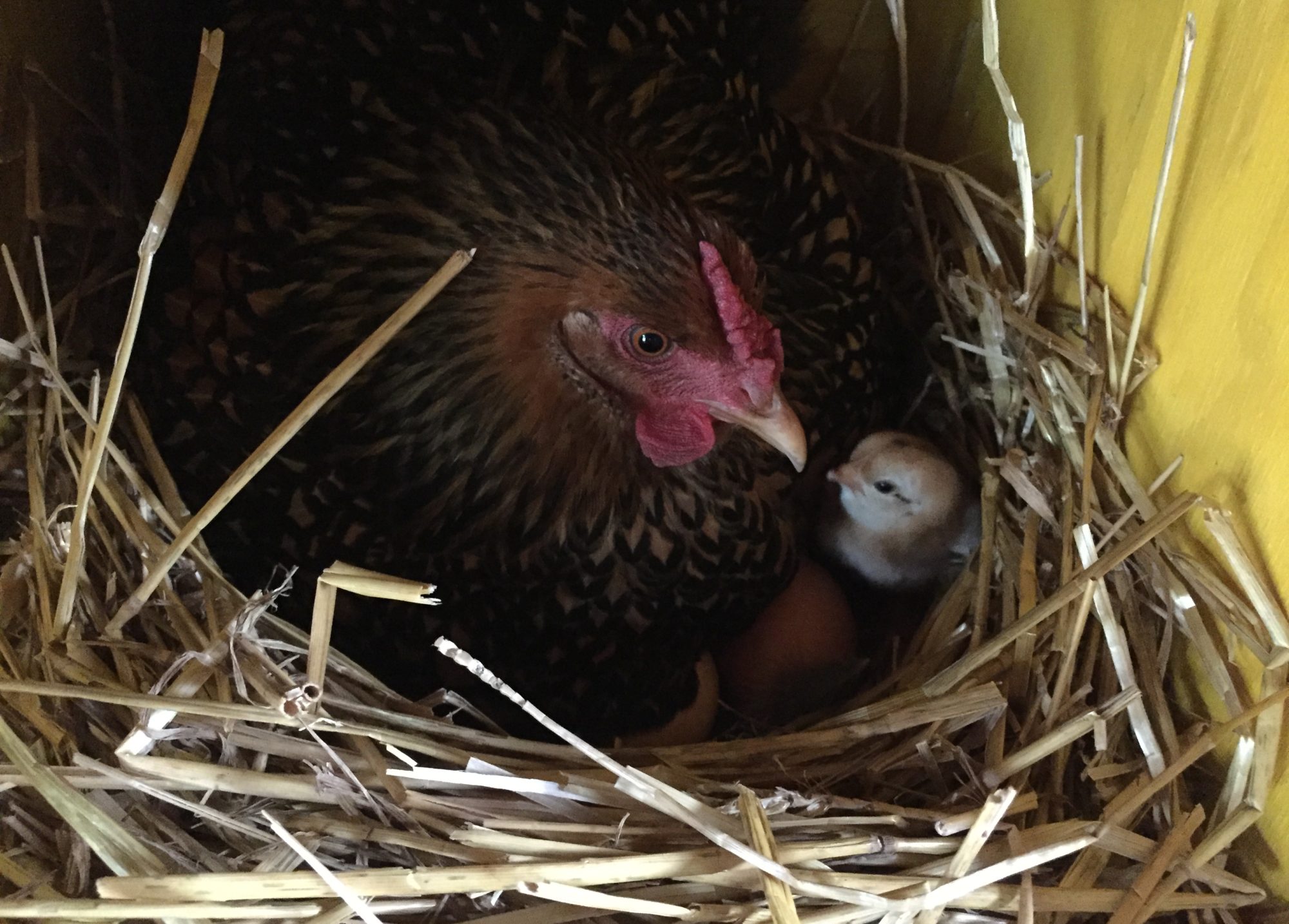OK, we know chickens don’t get pregnant (right?). But some hens want to have chicks. So how do you know if your hen is broody (wants babies), and what can you do about it?
First, you might think “I’ve had chickens for years, and I’ve never had a broody hen”. Not surprising. The hatcheries have somehow figured out how to breed the broodiness out of hens, so that only about 1 in 10 hens will be broody. And some hybrid breeds rarely go broody. So if you only have a few hens or certain breeds, you won’t have a broody hen very often.

Hens usually go broody in Spring and Summer, although we’ve had hens go broody as early as January and as late as October. We get close to 90 broody hens each year, so we’re very familiar with how to spot one.
What Are the Signs?
- Nesting. It seems like she’s always in the nest box. You take her out and put her on a roost at bedtime, and the next morning she’s back in the box.
- Lying Flat. Compared to a laying hen, a broody hen lays as flat as possible. It’s noticeable.
- Cranky. If you try to pet a broody hen or check for eggs, you’ll probably get a loud screech, and maybe a peck on the hand. They don’t want anyone messing with their future children!

- Pale Comb & Wattles. Because the hen is not active and isn’t eating much, her comb and wattles will pale from bright red to pink.
- Egg Tucking. All the eggs within her reach are nicely tucked up under her. Put an egg in front of her, and she will roll it with her beak under her.
- Not Laying Eggs. If you have just a few hens, you know how many eggs you get each day. A broody hen stops laying when she starts sitting.
- Missing Belly Feathers. Broody hens will often remove belly feathers in order to get direct skin contact to the eggs.
- Ginormous Poop! Broody hens only get up a couple of times each day to eat, drink, and poop. Chickens normally poop about every 30 minutes, but a broody hen won’t contaminate her nursery with bacteria laden waste. So she holds it. And holds it. When she gets up, you’d swear a large dog took a dump in the coop. And it’s extra stinky!
- Not Eating & Drinking. To reduce the amount of poop, a broody hen eats and drinks very little. She will lose about 1/3 of her body weight over 3 weeks of sitting.
What if she has no eggs to sit on? If you’ve collected her eggs leading up to her sitting, it won’t deter her. She will still sit and hope to find some eggs along the way. Nature tells her to sit, so she sits!
Will my hen go broody if I don’t have a rooster? Yep! She doesn’t care about a rooster; she wants to be a mom. Nature.
What Are My Options?
1, Give Her Fertilized Eggs. If you don’t have fertilized eggs because you don’t have a rooster, then seek out a local chicken farm that does. Get eggs under her as soon as possible, since she’s expecting chicks in about 3 weeks after she starts sitting. Make sure you mark the eggs so you’ll know which ones not to eat! Give her 6 to 10 eggs. Expect about 60-70% to hatch.
2. Give Her Chicks. Instead of her hatching eggs, let her sit on fake eggs or golf balls. Then between 2 and 4 weeks, buy some chicks from the farm store. Slip them under the hen when it’s dark. In the morning, chances are she will accept them. In the morning, move everyone to a secure location.

3. Break Her. If you don’t want any more chickens, then you can try breaking the broody trance she is in. To do that, you’ll want to make her uncomfortable. Move her to something like a wire dog cage. Don’t give her any bedding or a roost bar. Give food and water, but no place to keep sitting comfortably. After about 3 days, you may find that she was so uncomfortable, that she forgot about being broody. If you let her go and she heads back to the nest box, then it’s back to the dog cage. Some try to break a broody by dunking her in cold water to reduce her warmer body temperature. It may work, but we find that a bit cruel since birds prefer to be dry.
One thing you DON’T want to do is to let her sit without doing anything. She won’t give up easily, and the longer she sits, the more weight she will lose. And the harder it will be for her to rejoin the flock and stay healthy. The other hens may pick on her because they know she is weak. We’ve even had older hens die after being broody and raising chicks because the process is so hard on their body.

While she raises her chicks, a hen will continue to not lay eggs for about 5 weeks while she returns to a healthy weight. About the time she lays again, the hen will leave her chicks and return to the flock.
A broody hen will usually be broody the next year and every year after. Some hens won’t be broody until they are 3-4 years old. And some hens will be broody twice or even three times in a summer. Whether you consider a broody hen a blessing or a curse, it’s always fun to watch mama hen taking care of her babies.



